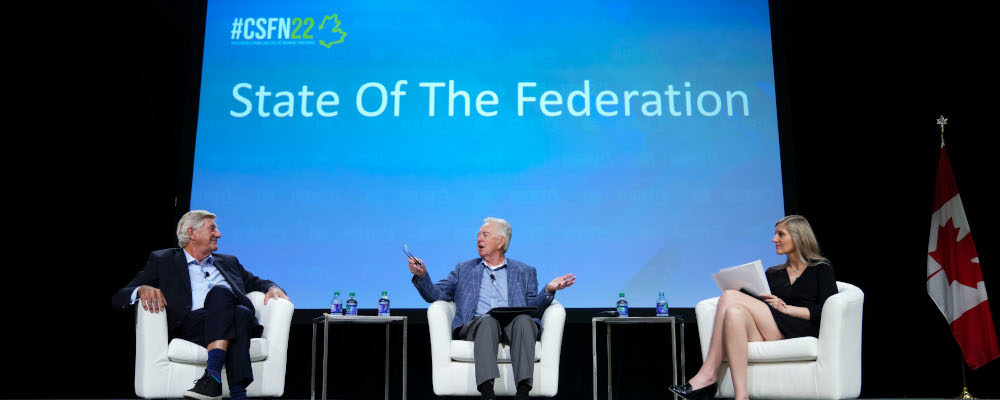While the first two Conservative party leadership debates have rightly been criticized for their lack of substance, one gets the sense that there’s something more interesting and substantive going on in the broader world of Canadian conservatism.
Last week, the Canadian Strong and Free Network hosted its first networking conference in Ottawa in three years. It was one of its best-attended conferences in a long time. There was a ton of energy and enthusiasm on display over the course of three days.
The most promising aspect though was the scope of intra-conservative debate. This was a venue for a good-faith contest of ideas among conservatives of different ages, regions, and ideological preferences. There were pro-Kenney conservatives and anti-Kenney conservatives. There were conservatives in favour of carbon taxes and those who vehemently opposed them. There were those who support Quebec’s Bill 211“The government of Quebec is banning Canadians working in those professions from wearing religious symbols such as crosses, hijabs, turbans and yarmulkes.” https://ccla.org/major-cases-and-reports/bill-21/ and conservatives who reject it. There were social conservatives and libertarians. And on and on and on.
To the extent that the media and most Canadians followed the conference, it was probably Thursday night’s leadership debate, which, as we discussed on last week’s Hub weekly Roundtable podcast, wasn’t representative of the richness of these intermural tensions.2A ‘policy-free conversation’: The Hub Roundtable breaks down the first CPC leadership debate It was actually the plenary sessions, hallway conversations, and post-conference receptions where one encountered big ideas, passionate yet respectful debate, and a sense that Canadian conservatives are grappling with a series of first-order questions.
Incoming Canada Strong and Free Network president, Jamil Jivani, debated Reason Magazine’s Robby Soave on how conservatives ought to think about the role of big tech firms in our economy and society. We’ll have their opening statements at The Hub next week, but the two drew on conservative ideas and insights in their disagreement about the perceived harms of social media and the potential for government regulation.
I moderated a panel on the future of labour market issues. There were tensions there too. Labour lawyer Kathryn Marshall argued against the utility of labour unions in the modern economy and in favour of a relatively laissez-faire response to the rise of gig work. Brian Dijkema from the Cardus Institute, by contrast, described trade unions as one of the most important civil society institutions besides the family itself, and Oren Cass, the founder of American Compass and a heterodox conservative thinker, argued that the so-called “gigification” of work represents a regrettable socio-economic development.
These intra-conservative tensions can similarly be found on The Hub’s pages this week. We had Chris Spoke, a housing policy expert and regular Hub contributor, respond to a debate that we ran last week at The Hub about the role of the federal government to try to catalyse local land-use reforms. We’ve also recently run competing articles on democratic reform including whether parliament should be bigger or smaller.
On the margins of the Canada Strong and Free Network conference, I participated in a panel discussion at the Cardus Institute where there was even debate about how conservatives should tactically respond to growing cultural changes in society. There was a view among some of the panelists that as major institutions such as big business, universities, and the media have come to abandon their viewpoint neutrality, there’s a need for conservatives to firmly push back including using the levers of political power.
I happen to think that the Federalist Society’s multi-decade, incremental, and institutional transformation of the U.S. judiciary is evidence that conservatives can still influence mainstream institutions through an old-fashioned combination of organization, ideas, and persuasion rather than the use of brute political force. But this is a worthy subject of debate.
The point here is for all the handwringing about the rhetorical and partisan excesses of the leadership debates, something kind of interesting and exciting is going on in the world of Canadian conservatism. It seems to be reinvigorating itself as a locus of ideas and debate.
This is something of a renewed development. While the Harper government was self-evidently good for Canadian conservatism, its one downside is that nearly ten years in power eventually led conservatives to equate their ideological movement’s interests with the government’s interests. Intra-conservative debate narrowed and the government’s policies and partisan preferences increasingly became a movement-wide default.
But conservatism is at its best when it is subjecting itself to internal pressure testing involving its different ideological factions. We’re starting to see the policy outgrowth of these nascent ideational developments in the post-Harper era.
Consider, for instance, the conference’s plenary session with Marshall Smith, the chief of staff to Alberta’s minister of mental health and addiction, and Michael Shellenberger, a California gubernatorial candidate, on the tragic failure of the harm reduction model for treating drug addiction and the need for a recovery-focused strategy now reflected in the so-called “Alberta model” conceived of and advanced by the Kenney government.3Treating addicts is the solution, not supplying illicit drugs
It’s a powerful case study of bringing conservative ideas and insights to bear on the big questions facing contemporary society. Canadian Conservatives (and conservatives) should extend the same methodology to a broader set of new and emerging issues.
This method of applying fixed principles to dynamic questions is what former Prime Minister Harper has called “applied conservatism.” It’s a complex process that will necessarily involve some tension and debate as conservatives work through how their core insights and principles (such as preferences for choice, competition, decentralization, and subsidiarity) apply to contemporary issues such as big tech or gig work or housing affordability. But, at its core, it’s about bringing policy expression to Ronald Reagan’s famous formulation: “I do not want to go back to the past; I want to go back to the past way of facing the future.”4Leading the Way: The Story of Ed Feulner and the Heritage Foundation
One explanation for this growing intellectual contestation among conservatives is the generational change that The Hub’s editor in chief Stuart Thomson recently documented. Younger conservatives—many of who I met over the weekend—share some key differences from their older partisans. They’re less committed to old policy dogmas, more interested in issues of culture and identity, and are bringing new energy and ideas to their generation’s major questions, including housing affordability, delayed family formation, and other basic touchpoints of middle-class progress.
While on balance, I still think that progressives are winning the battle of ideas, the conservatives are less behind than I understood. There’s something interesting going on. It’s yet to be seen if and how it will ultimately travel downstream to big “C” Conservative politics which are far less interesting as the leadership debates have thus far shown. But the early seeds of renewal were present at the Canada Strong and Free Network conference. And that’s a reason for optimism.




